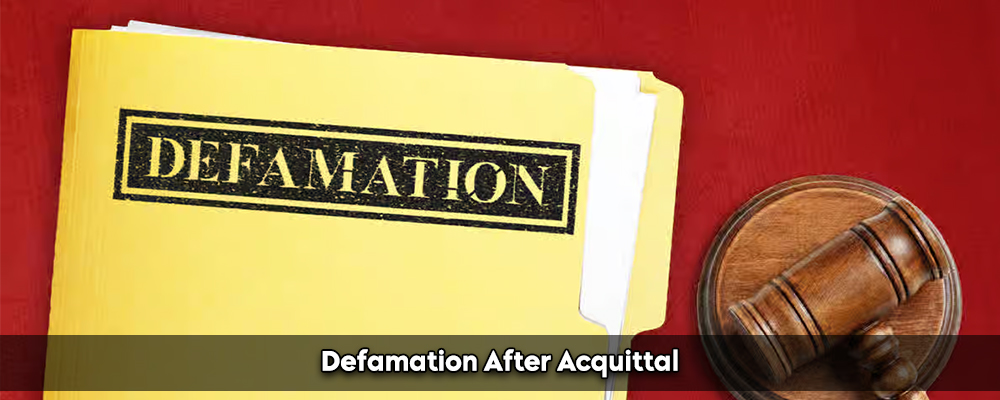In the realm of legal intricacies, the aftermath of an acquittal in a criminal case is often viewed as a moment of vindication and relief for the accused. However, the landscape becomes more complex when the spectre of defamation looms large. In India, the interplay between acquittal and defamation poses challenges that demand a nuanced understanding of legal principles and societal perceptions.
Defamation: About
Defamation, as a legal concept, refers to the act of damaging the reputation of an individual or an entity through false statements, either spoken (slander) or written (libel). In India, defamation is both a civil and criminal offense, with the potential for substantial legal consequences.
Need A Legal Advice
The internet is not a lawyer and neither are you. Talk to a real lawyer about your legal issue

Acquittal and the Presumption of Innocence
- An acquittal in a criminal case signifies that the accused has been found not guilty beyond a reasonable doubt. It is crucial to recognize that an acquittal does not automatically imply innocence; rather, it underscores the prosecution’s failure to meet the burden of proof required for a conviction.
- The legal principle of “presumption of innocence” continues to shield the acquitted individual from being labelled a criminal.
Interplay Between Acquittal and Defamation
- In the aftermath of defamation after acquittal, the individual may breathe a sigh of relief, believing that the legal battle is over. However, the landscape shifts when third parties, such as media outlets or individuals, continue to propagate the accusations or insinuate guilt.
- This raises the question: Can a person be defamed even after being acquitted?
Legal Ramifications
- In India, the legal ramifications of post-acquittal defamation are complex. The acquitted individual may have grounds for filing a defamation suit against those who persist in making false and damaging statements. However, the burden of proof in defamation cases lies with the plaintiff, requiring them to establish that the statements were false, damaging, and made with malicious intent.
- Section 499 of the Indian Penal Code defines defamation, and Section 500 prescribes the punishment for the offense. Despite the legal provisions, the road to seeking redress for post-acquittal defamation is fraught with challenges, including the need to demonstrate malice on the part of the defamer.
Media’s Role and Responsibility
- Media plays a pivotal role in shaping public opinion, and its responsibility in reporting post-acquittal cases cannot be overstated. Fairness, impartiality, and accuracy are requirements of journalistic ethics.
- However, sensationalism and the race for breaking news often overshadow these principles, potentially perpetuating misinformation and causing irreparable harm to the individual who has been acquitted.
The Need for Legal Reforms
- The intersection of acquittal and defamation underscores the need for legal reforms to strike a balance between freedom of speech and the protection of an individual’s reputation. The legal system should evolve to provide swiffer remedies for those who find themselves unfairly targeted by post-acquittal defamation.
- One possible reform could be the creation of a legal mechanism to expedite defamation cases related to post-acquittal situations. This would ensure that individuals have a timely avenue to seek redress and prevent prolonged damage to their reputation.
- Moreover, legal education and awareness campaigns could emphasize the distinction between acquittal and innocence, fostering a better understanding of the legal principles at play. This, in turn, may contribute to a more informed public discourse.
Societal Perception and Attached Stigma
- Despite legal safeguards, the societal stigma associated with being accused of a crime can persist even after an acquittal. The court of public opinion often operates independently of legal verdicts, and individuals may find themselves grappling with a tarnished reputation long after the legal battle concludes.
- It is incumbent upon society to recognize the importance of the presumption of innocence and refrain from perpetuating baseless accusations. Public figures, in particular, should exercise caution in their statements, as their words carry significant weight and can influence public opinion.
The aftermath of an acquittal in India reveals a complex interplay between legal principles, media responsibility, and societal perceptions. Defamation after acquittal raises important questions about the rights of the acquitted individual and the need for legal reforms to address the challenges posed by post-acquittal defamation.
One can talk to lawyers from Lead India for any kind of legal support. In India, free legal advice online can be obtained at Lead India. Along with receiving free legal advice online, one can also ask questions to the experts online free through Lead India.





 Talk to a Lawyer
Talk to a Lawyer